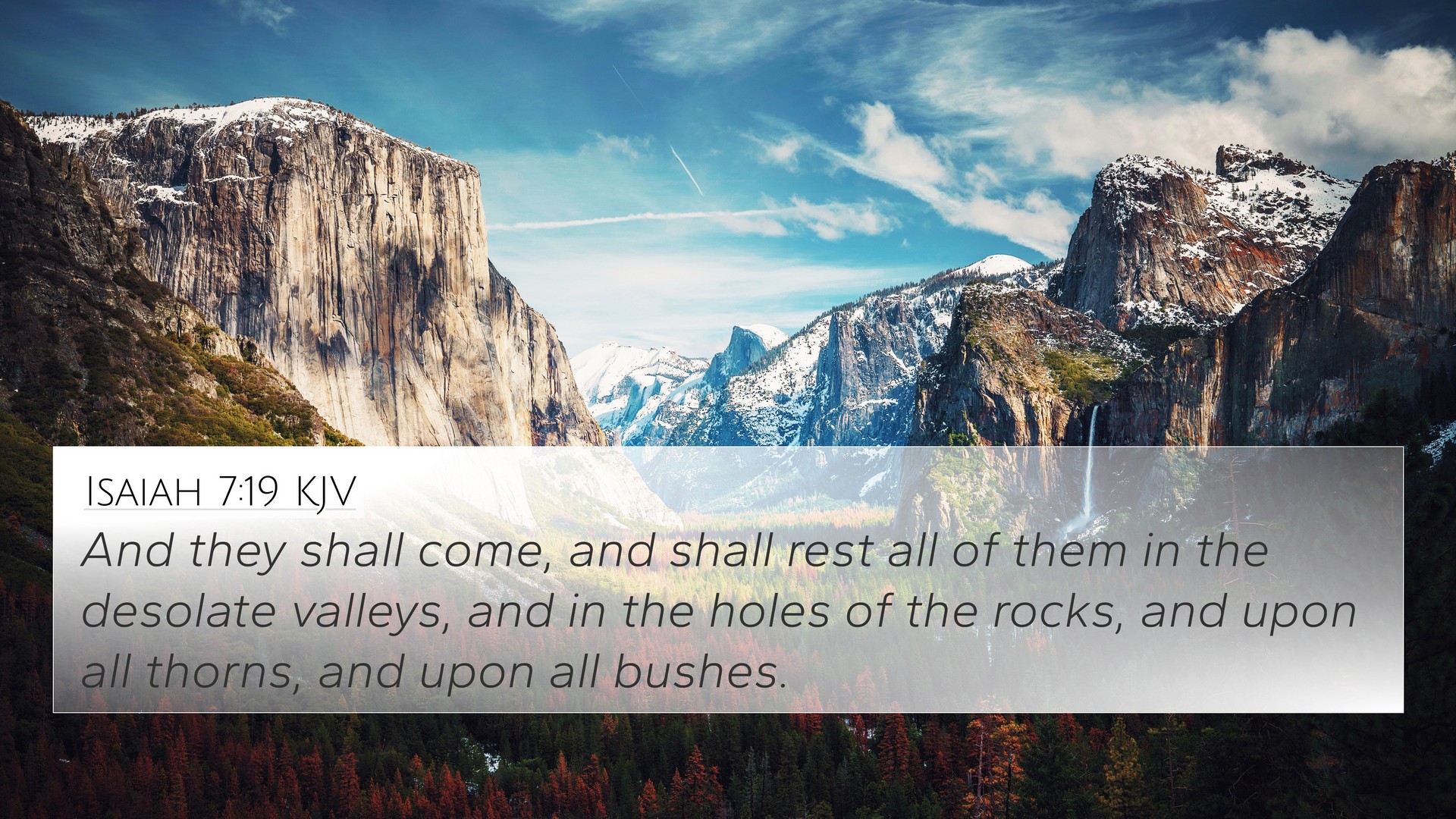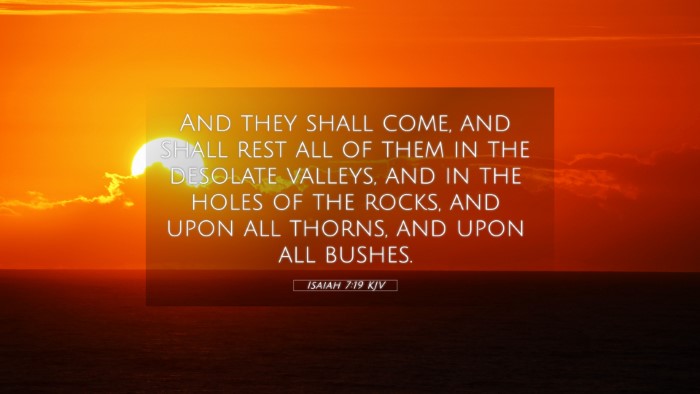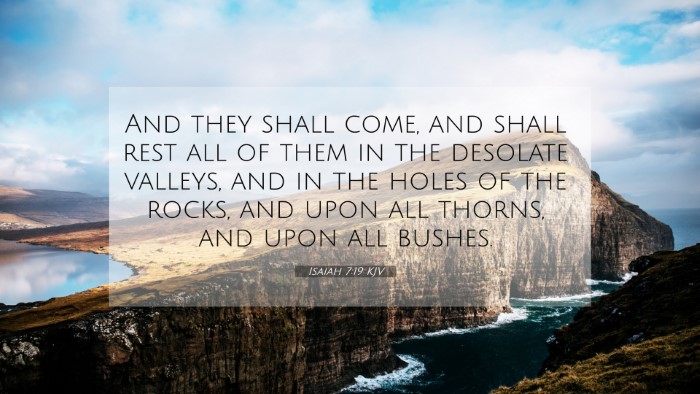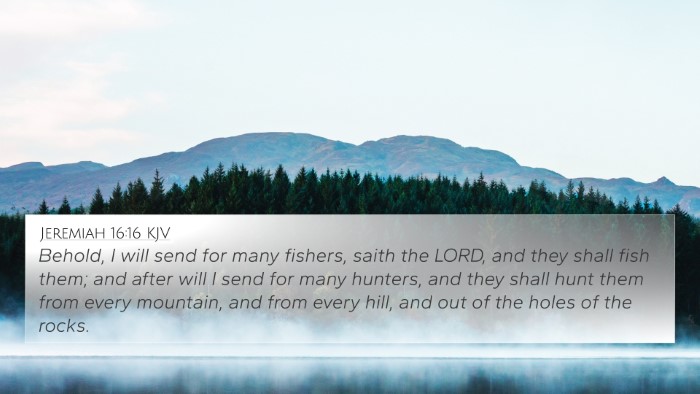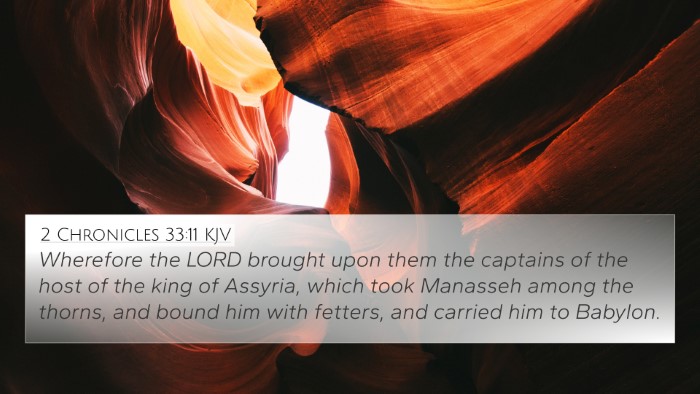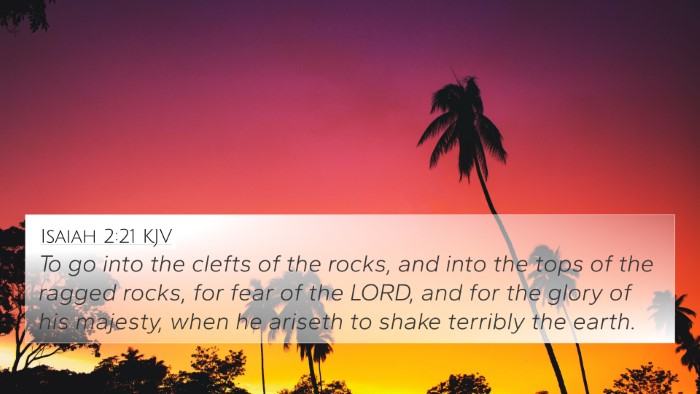Understanding Isaiah 7:19
Isaiah 7:19 states: "And they shall come, and shall rest all of them in the desolate valleys, and in the holes of the rocks, and upon all thorns, and upon all bushes."
This verse highlights a time of distress and desolation, reflecting the consequences of a nation that has turned away from God. The imagery of resting in desolate places illustrates a profound sense of despair and hopelessness, indicating a significant punishment for disobedience.
Commentary Insights
The following insights from reputable public domain commentaries bring deeper understanding to this verse:
-
Matthew Henry's Commentary:
Matthew Henry emphasizes the futility of seeking refuge in desolation. The reference to the "holes of the rocks" and "thorns" symbolizes the uncomfortable and dire circumstances that arise from turning away from God's guidance. It illustrates that when people reject divine truth, they often end up in places that provide no true safety or comfort.
-
Albert Barnes' Notes:
Albert Barnes interprets this verse as a prophetic indication of the Assyrian invasion. The "desolate valleys" represent regions that would be devastated by conflict, emphasizing the reality that God’s judgment brings inevitable suffering. Barnes also notes the symbolism of each area mentioned—indicating both physical and spiritual barrenness for those who experience judgment.
-
Adam Clarke's Commentary:
Adam Clarke provides an understanding of this prophecy as a forewarning to the people of Israel. He suggests that the verse describes how, irrespective of their efforts to escape, they cannot avoid the inevitable consequences of their actions. Clarke points out the stark imagery used illustrates profound hopelessness which serves as a call to repentance.
Bible Verse Cross-References
This verse interlinks with several other scriptures. Below are some relevant cross-references:
- Leviticus 26:33: "And I will scatter you among the nations, and will draw out a sword after you: and your land shall be desolate, and your cities waste."
- Isaiah 8:22: "And they shall look unto the earth; and behold trouble and darkness, dimness of anguish; and they shall be driven to darkness."
- Jeremiah 9:10: "For the mountains will I take up a lamentation, and wailing of the pastures of the wilderness, because they are burnt up, so that none can pass through them; neither can men hear the voice of the cattle; both the fowl of the heavens and the beast are fled; they are gone."
- Jeremiah 30:7: "Alas! for that day is great, so that none is like it: it is even the time of Jacob's trouble; but he shall be saved out of it."
- Ezekiel 33:27: "Say thou thus unto them, Thus saith the Lord God; As I live, surely they that are in the wastes shall fall by the sword, and him that is in the open field will I give to the beasts to be devoured; and they that be in the forts and in the caves shall die of the pestilence."
- Matthew 24:16: "Then let those who are in Judea flee to the mountains."
- Luke 21:20-21: "And when ye shall see Jerusalem compassed with armies, then know that the desolation thereof is nigh."
Connections Between Bible Verses
Isaiah 7:19 serves as a reflective reminder and a stern warning about the grave outcomes of straying from God's path. The imagery created in these verses enhances thematic connections throughout the Bible concerning judgment, desolation, and the need for repentance.
- Thematic Bible Verse Connections: These themes are present in the prophecies of Jeremiah and Ezekiel, where similar warnings of desolation appear.
- Cross-Referencing Biblical Texts: Utilizing tools for bible cross-referencing can yield deeper insights into how interconnected these warnings are.
- Comparative Bible Verse Analysis: Analysis between Isaiah's prophecies and the teachings of Jesus can reveal the continuity of the message regarding consequences faced by nations.
How to Use Bible Cross-References
Understanding Isaiah 7:19 within the context of its surrounding scriptures provides perspective and reveals God's character and His expectations of His people. To effectively use Bible cross-reference guides:
- Identify key themes or words, such as 'desolation' or 'judgment'.
- Utilize a Bible concordance to find other instances of similar themes.
- Engage with interpretation methods that explore parallels between Old and New Testament texts.
Conclusion
Isaiah 7:19 serves as a poignant reminder of the consequences of neglecting God’s commands. The insights from various commentaries, alongside the inter-Biblical dialogue and connections between verses, underscore the importance of acknowledging and learning from biblical warnings. Being aware of the intricate web of scriptural interrelations can immensely enhance comprehension and provide clarity in the study of the Bible.
